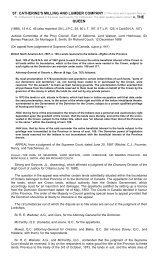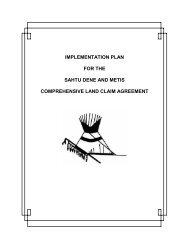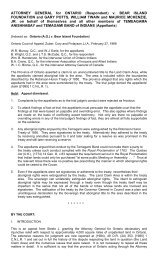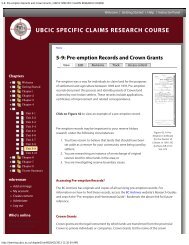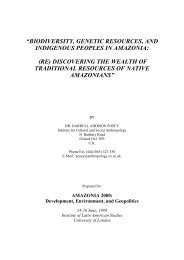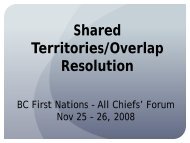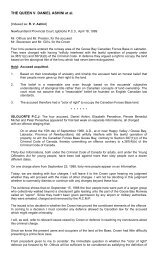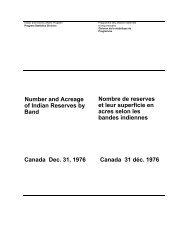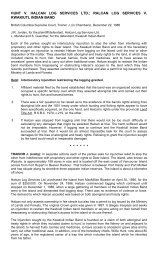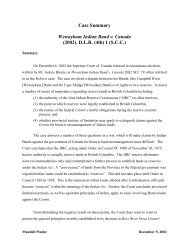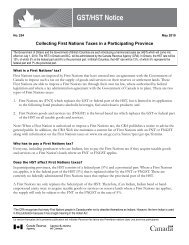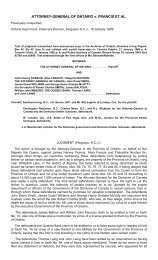Constitutional âPropertyâ and Reserve Creation: Seybold Revisited
Constitutional âPropertyâ and Reserve Creation: Seybold Revisited
Constitutional âPropertyâ and Reserve Creation: Seybold Revisited
You also want an ePaper? Increase the reach of your titles
YUMPU automatically turns print PDFs into web optimized ePapers that Google loves.
6 MANITOBA LAW JOURNAL VOL 32 NO 1ference with “the times of year during which fishing is to be allowed, or the instrumentswhich may be employed.” When dealing with the bounds of jurisdiction<strong>and</strong> property of the Crown, there may be jurisdiction in the one that interfereswith the beneficial use of the other. This approach was affirmed by the SupremeCourt more recently in a fisheries case entitled Ward. 19A good rule of thumb is that if the legislature with jurisdiction is able to impactthe private property of a subject with that power, then it can likewise impactthe “beneficial interest” of the other legislature. 20 Section 109 “ownership” in theprovince does not immunize the province from valid legislation in the Dominionwhich relates to use of that property. 21 Although the Fisheries Case on its face appearsto conclude that s. 91 does not allow the federal government to do anythingthat transfers to itself s. 109 rights, it is hardly the final word on the subject.Pronouncements in that case relating to other powers under s. 91 are obiter.The Fisheries Case indicates that the federal government may be able to use itsjurisdiction to regulate the use of s. 109 or other provincially administeredCrown property, but that this will not normally extend to the taking of or disposalof provincial “property”. This approach taken alone might seem logicalenough, but read in light of the indivisibility of the Crown the approach mustclearly have limits. Section 109 must be read purposively in light of its limitations,because it does not in fact vest l<strong>and</strong> ownership in the provinces. In theFisheries Case, s. 91 is described as non-proprietary. However, it does not logicallyfollow from the Constitution Act, 1867 that one should draw a hard line betweenclasses of provisions relating to jurisdiction, e.g. ss..91 <strong>and</strong> 92 which should beread according to their soft edged pith <strong>and</strong> substance boundaries – <strong>and</strong> ss. 109<strong>and</strong> 117, which should describe watertight plenary proprietary powers. After all,if the Fisheries Case were followed on this point, s. 91(1A) which deals with fed-20This proposition works both ways. Federal ownership of harbours for example does not precludethe application of provincial zoning laws. See Hamilton Harbour Commissioners v. City ofHamilton (1978), 91 D.L.R. (3d) 353, 6 M.P.L.R. 183, 21 O.R. (2d) 459 (Ont. C.A.)[Hamilton Harbour]. However this proposition is not applied consistently, often, federal l<strong>and</strong>sare exempt from zoning bylaws, see Wilkins, supra note 1. In my view, holding that zoningbylaws are inapplicable because they relate to the use of l<strong>and</strong> is inconsistent with the approachin the Fisheries Case, supra note 8. Also see Ward, infra note 21.21Fisheries Case, supra note 8. Also see Reference Re Water <strong>and</strong> Water Powers, [1929] S.C.R. 200 at212 [Water Powers]. Duff J held that the Dominion cannot take ownership of the fish belongingto the province: “This, of course, is not to say that the Dominion in exercising its legislativeauthority under s. 91, may not legislate in such a way as to affect the proprietary rights ofa Province.”. In Ward v. Canada (Attorney General), [2002] 1 S.C.R. 569, [2002] S.C.J. No. 21[Ward] at para. 36 the Court accepted case law that found that the fisheries power extends to“suppression of an owner's right of utilization.” The court further held at para. 48 that, “theissue is rather whether the matter regulated is essentially connected -- related in pith <strong>and</strong> substance-- to the Federal fisheries power, or to the provincial power over property <strong>and</strong> civilrights.”



